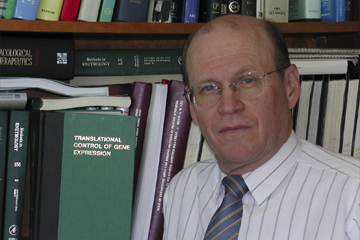Nahum Sonenberg to receive 41st Rosenstiel Award
Award is strong predictor of the Nobel Prize

Nahum Sonenberg
Nahum Sonenberg, professor of biochemistry at the Goodman Cancer Research Center at McGill University, has been awarded the 41st Lewis S. Rosenstiel Award for Distinguished Work in Basic Medical Science. His research has revolutionized understanding of processes ranging from the response to insulin, cellular development, immunology as well as learning and memory.
Sonenberg is being honored for his transformative studies of the control of protein synthesis in normal mammalian cells, in virally infected cells and in cancer cells. He first revealed how messenger RNAs (mRNAs) are selected for protein translation, how this translation is initiated and how a variety of regulatory factors control the efficiency of translation. He will present a lecture on his work at an award ceremony at Brandeis on March 29, 2012.
Sonenberg’s wide-ranging investigations have profoundly changed our understanding of one of the central processes of gene expression and showed how translational control affects cancer, viral infection, development and memory.
The Rosenstiel Award was established in 1971 to highlight the important role educational institutions play in encouraging and developing basic science as it applies to medicine. Awards are presented annually to scientists who have made discoveries of particular originality and importance to basic medical research. Winners are selected by a panel of scientists assembled by the Rosenstiel Basic Medical Sciences Research Center at Brandeis. Over the decades, more than two dozen Rosenstiel winners have gone on to win the Nobel Prize.
Since the Rosenstiel Center was established in 1968, Brandeis has placed great emphasis on basic science and its relationship to medicine. The Rosenstiel Awards are viewed as a means of extending the center's support beyond the campus community.
Recent previous awardees include C. David Allis and Michael Grunstein, two innovative scientists who established the key molecular connections between histones, histone modifications and chromatin structure and their effect on the regulation of gene transcription (2011); Jules Hoffman and Ruslan Medzhitov for their pioneering studies of innate immunity (2010) and John Gurdon, Irving Weissman and Shinya Yamanaka for their work on reprogramming differentiated cells into stem cells (2009). View a list of past winners.
Categories: Research, Science and Technology






